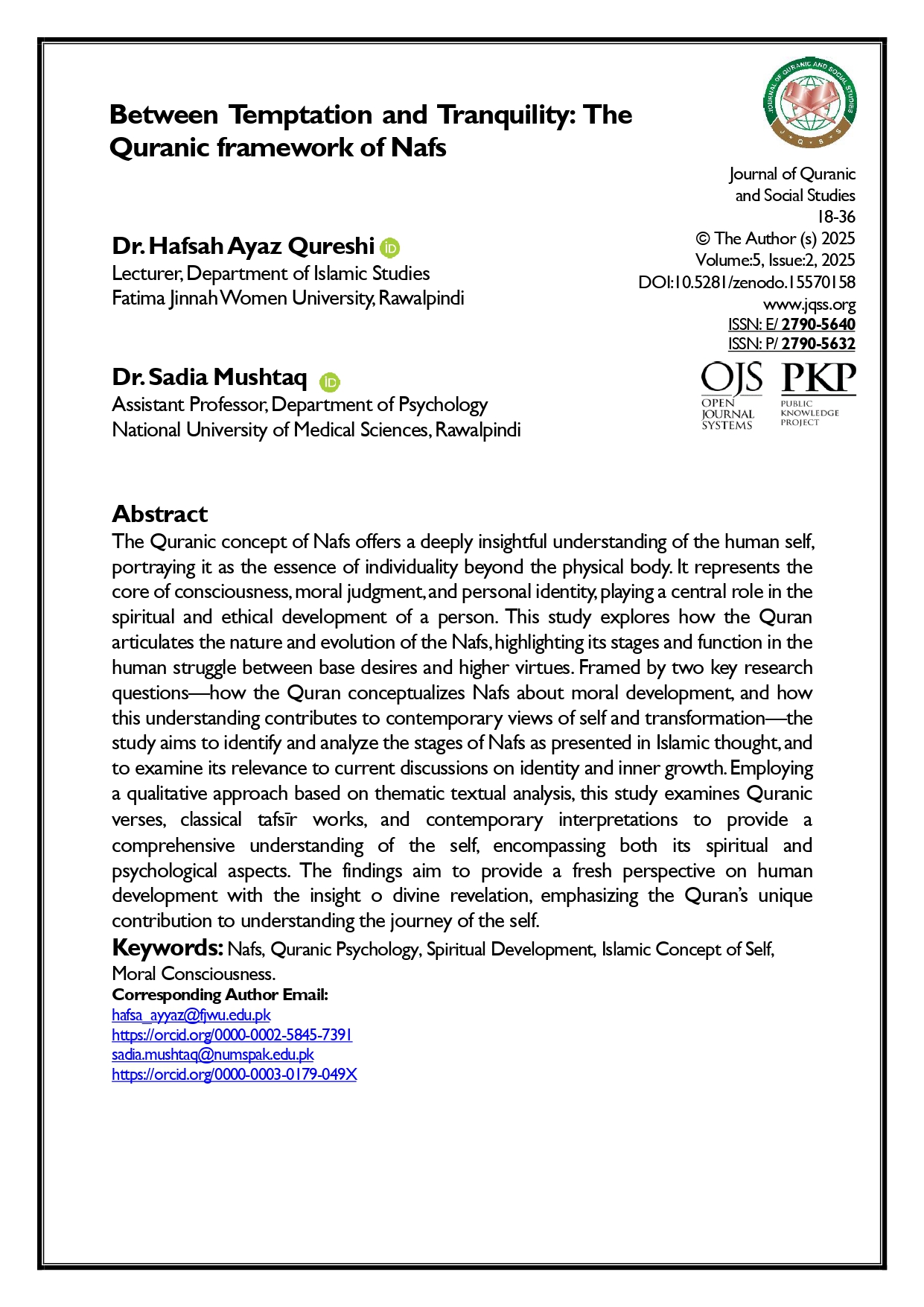Between Temptation and Tranquillity: The Quranic framework of Nafs
DOI:
https://doi.org/10.5281/zenodo.15570158Keywords:
Nafs, Quranic Psychology, Spiritual Development, Islamic Concept of Self, Moral Consciousness.Abstract
The Quranic concept of Nafs offers a deeply insightful understanding of the human self, portraying it as the essence of individuality beyond the physical body. It represents the core of consciousness, moral judgment, and personal identity, playing a central role in the spiritual and ethical development of a person. This study explores how the Quran articulates the nature and evolution of the Nafs, highlighting its stages and function in the human struggle between base desires and higher virtues. Framed by two key research questions—how the Quran conceptualizes Nafs about moral development, and how this understanding contributes to contemporary views of self and transformation—the study aims to identify and analyze the stages of Nafs as presented in Islamic thought, and to examine its relevance to current discussions on identity and inner growth. Employing a qualitative approach based on thematic textual analysis, this study examines Quranic verses, classical tafsīr works, and contemporary interpretations to provide a comprehensive understanding of the self, encompassing both its spiritual and psychological aspects. The findings aim to provide a fresh perspective on human development with the insight o divine revelation, emphasizing the Quran’s unique contribution to understanding the journey of the self.
Downloads
References
Jane Dammen McAuliffe, The Encyclopedia of The Quran,( Netherlands: Brill, 2001) s.v. “Soul.”
Fuad 'Abd Al Baqi, Al-Mu jam al-Mufahras li 'I-Qur'an al-Azim, s.v. “ ن ف س.” https://archive.org/details/AlMujamAlMufahrasLiAlfazhAlQuran
Ghafir: 15
Al-Mâ’idah:32
An-Nisâ’:1
Al-Mu’minûn:26
An-Nâzi‘ât:40
Az-Zumar:42
Al-Ghazali, Ihya Ulum al-Din (Revival of Religious Learning), trans. Fazal Karem, vol. 3 (Lahore: Sh. Muhammad Ashraf, n.d.), 8–9.
Ibn al Qayyim, Madarij as-Salikîn Baeenna Manzil Iyyaka Na‘Budu Wa Iyyaka Nasta‘În (Cairo: Al-Hayʼah al-Miṣrīyah al-ʻĀmmah lil-Kitāb, 1980), vol. 1, 308.
Ibid.
Sa’id Hawwa, Tarbiyatun nar Ruhiyah, (Cairo: Dar al- Salam, 2009),32.
Al-Fajr-:27-28
Al-Qiyamah:2
Hawwa, Tarbiyatun nar Ruhîyah, 35.
Ragib Isfahani, Mufradat fi ghariab ul Quran, s.v. “أمر.”
https://archive.org/details/MufradatalQuran-Raghib/mode/2up
Abdullah Yousaf Ali, The Meaning of the Holy Quran (Amana Publications; Arab,2008), 564
Jurjani, At-Tareefat (Beruit: Dar-ul-Kitab al Arabi),Vol. 1, 252
Imam Razi, Mafateeh Al-Ghayb (Beruit: Dar-ul-Fikr, 1981), vol. 9, 125.
Yûsuf:53
Imam Razi, Mafateeh Al-Ghayb, vol 9, 125.
Muhammad Ali As-Sabuni, Safwat at-Tafasir (Cairo: Dar as-Sabuni, 1996), vol.2, 52
Faridi Shahidullah, The inner aspects of faith (Karachi: Mahfil-e-Zauqia, 1986), 55-56
Qaf:16
Ibn Kathir, Tafseer Ibn Kathir, Abridged by a group of scholars under the supervision of Shaykh Safiur Rahman al Mubarikpuri (Riyadh: Darus salam Publisher, 2000)Vol .6, 319
An-Nâzi‘ât:40
Jalalud-din Mahalli and Jalaludin Suyuti, Tafsir Al-Jalalayn, trans. Feras Hamza (Jordon: Royal aal al-Bayt Institute for Islamic Thought,2007), 550.
Al-Tabari, Jam i' Al-Bayan ‘an taweel ay al-Quran (Riyad: Dar 'Aalim al-Kutub,n.d) Vol. 24, 98.
Yûsuf:17-18
Isfahani, Al-Mufradat, Vol. 1, 30.
Tâ-Hâ:96
Imam Razi, Mafateeh-al-Ghayb, Vol .11, 97.
Al-Mâ’idah:30
Imam Razi, Mafateeh-al-Ghayb, Vol.6,164.
Al-Farra Al-Baghawi, Tafseer-e-Baghawi, trans. Saud Kashmiri and et.al (Pakistan: Idarah Taleefat Ashrafiyah, 1436H), vol. 2, 35
Mahmoud Mostafa, The Attributes and Names of the ranks and stations of nafs in its striving and elevation,” https://www.scribd.com/document/47573445/7-Stations-of-the-Nafs-self
Al-Qiyamah:2
Jurjani, At-Tareefat (Beruit: Dar-ul-Kitab al Arabi),Vol.1, 243.
Ibn-e-Arabi, Tafsir al Quran al Karim (Dar al-Kutub Al-Ilmiyah, 1981), 357.
Ibn Kathir, Tafseer Ibn Kathir, Vol.10, 262.
Ash-Shams:7-8
Ibn Kathir, Tafseer Ibn Kathir, vol.10, 262.
Ibid
Syed Abu A’la Maududi, The meaning of the Quran (Tafhim ul Quran), trans.Ch.Muhammad Akbar (Lahore: Islamic Publications,n.d), Vol.6, 162.
Ibid, 141
Muhammad bin yazid Majah, Sunan Ibn Majah (Dar ul Haya Al-Kutub,n.d)
, Book: Zuhd, Chapter: Repentance, Hadith 4251
Jurjani, At-Tareefat, Vol.1, 243
Al-Fajr:27
At-Tabri, Jami Al-Bayan ‘an Taweel ay al-Quran(Riyadh: Dar 'Aalim al-Kutub, n.d.) Vol. 24 , 398
Abu Esa At-Tirmidhee, Jami At-Tirmidhi( Saudia Arabia:Wadharat ash-shaun Al-Islamiyyah wa ad-dawah wal irshad, 2000) ,The Book on suckling, Chapter: What has been related about a woman's rights over her husband, Hadith 1162
Al-Fajr:27-28
Imam Razi, Mafateeh Al-Ghayb, Vol. 30, 160-1
Mufti Muhammad Shafi Usmani, Ma’arif-ul-Quran, trans. Maulana Ahmed Khalil Aziz (Karachi: Maktaba-e-Dar-ul-uloom), Vol. 8, 788.
Ar-Rad:28
Idries Shah, The Sufis (London: The Idrees Shah Foundation, 2015), 445
Ash-Shams:8
Ash: Shams:9
Mufti Muhammad Ashiq Ellahi, Anwar ul Bayan (Karachi; Dar-ul-Ishaat, 2005), trans. Mufti Afzal Hussain Elyas,Vol. 10, 404.
An-Nûr:52
Imam Muslim, Sahih Muslim, Book of Faith, Chapter: Evidence that the one who is content with Allah as his Lord, Islam as his religion, and Muhammad (S.A.W) as his prophet, then is a believer, even if he commits major sins, Hadith 58/54
Al-Fajr:28
Al-Baiyinah:8
Qaf:33-35
Shaykh Adil Al-Haqqani, The Path to Spiritual Excellence (America: Islamic Supreme Council of America, 2004), 103.

Downloads
Published
How to Cite
Issue
Section
License
Copyright (c) 2025 Author

This work is licensed under a Creative Commons Attribution-NonCommercial 4.0 International License.



























